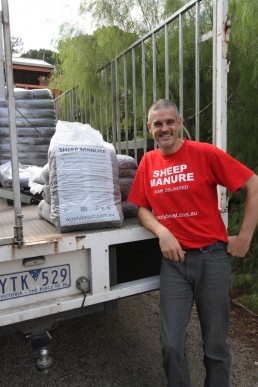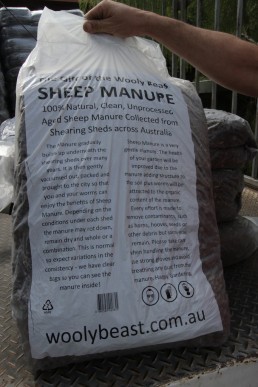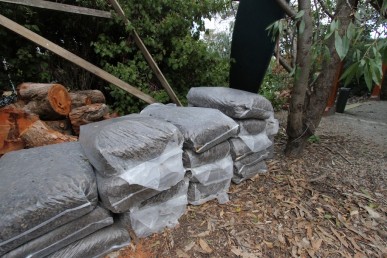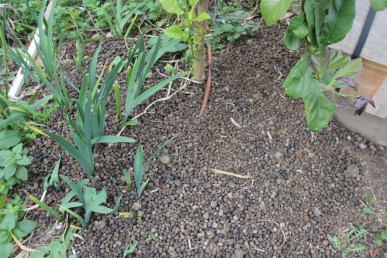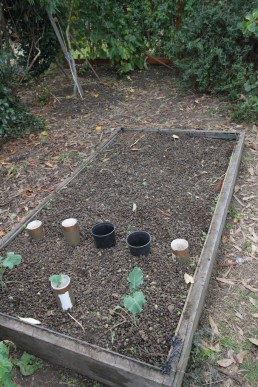by Penny Woodward
In searching for the best manure to use in my garden I drew up a list of requirements. I needed to be sure that:
1.It was not full of chemicals like pesticides and worming agents.
2. It was easy to handle.
3. It hadn’t travelled too far to get to me.
4. It wasn’t full of weed seed.
5. It wasn’t too fresh.
6. It wasn’t too expensive.
The best result would be a nearby organic farm that was happy for me to collect the manure for free. Unfortunately that doesn’t exist in my area and organic farmers these days realise the value of their manure and either use it themselves or charge well (quite legitimately) for it to be removed. Local chook farms are not organic as the manure is full of the pesticides used to keep pests at bay, a definite no! I have used local horse manure, but always compost it first as I never know whether the horses have been recently wormed. Although horse manure has weeds, if I collect it locally, they will be local weeds so chances are I already have them in the garden. But last year I found an alternative solution. I discovered The Gift of the Wooly Beast (lovely name) and since then this product has been the only manure I have used in the garden.
It ticks five of the six boxes above (it does travel some distance from the farms to me so doesn’t tick 3). I have been using the manure for over a year now and have found very few contaminants (a few bits of plastic) and had no weed problems. The worms love the manure and it breaks down rapidly to provide nutrients to plants. It can be added to the compost or, because it is already aged, can go straight onto the garden bed. According to Tim Marshall, in his lovely book The New Organic Gardener, sheep manure has 0.9 parts of Nitrogen, 0.5 of Phosphorous and 0.8 of Potassium, very similar to cow manure and a little higher than horse manure. Like most manures, sheep manure is not a complete fertiliser, but a great soil conditioner that adds nutrients, improves soil structure, increases moisture and nutrient retention, improves drainage and helps aerate the soil while increasing biological life in the soil.
Rhys Benbow, who started the business 4 or so years ago, is the son of a shearer. Rhys started collecting sheep manure from under shearing sheds as a boy, to earn extra pocket money. Even then he was mentally devising ways to make it easier to extract the manure from under the shed. After an Engineering degree and some years working as a Safety Risk Engineer, Rhys decided to put his ideas into practice and create a sheep manure extractor. In his words,” I thought about it for ten years, then went and bought a bunch of metal, learnt how to weld and built my design. It took me a couple of months, a fair bit of research and a bunch of calculations I wasn’t so sure of but it worked out. The main purpose of my vaccuum is to get the manure from under the shearing shed into the hopper which is outside and accessible but its also not to damage the manure. So it comes out the same as it was under the shed. If its dry and pebbly under the shed, then they will still be the same shape when they are sucked out. I can’t guarantee that there are no contaminants such a bit of wire or paper or plastic. So people do need to be careful when handling it. I’ve got it from under the shed the way it is, put it in a bag and given it to you. I don’t sieve or screen it. Its largely a beautiful product, pretty much weed free. Any seed, you put it into a moist environment, it will rot and this generally happens before I extract it. And people who are concerned, I tell them to leave it in a bag in the sun for two or three weeks, especially in the summer time, and you will cook the seed. If its very dry, poke some holes in the side and put some water in before leaving it in the sun. This will get rid of any seeds in here.”
“The vaccum works to suck it out into the big container we set up. You fire the machine up, jump under the shed with the rake and an extra length of pipe, we have sections which makes it flexible, get the pipes to go all different directions. So about half and hour to 45 minutes of raking the manure into the vaccuum making sure its flowing through ok, then outside after that bagging for about another hour to hour and a half. The bagging takes much longer. Then we put it on a pallet, wrap it up and thats it.”
It is a win/win situation for the farmers, Rhys and gardeners. The farmer gets a difficult and dirty job done for free, Rhys gets the manure for free (but does all the hard work), gardeners get a quality easy to use product that ticks all the boxes in the list above. (Except for 3. But 5 out of 6 is pretty good.)
The quality of the product
While not certified organic (this would be impossible because it is sourced from hundreds of shearing sheds around Victoria), Rhys is really careful to collect the manure only from shearing sheds that have no chemical treatments actually happening in the shed. When sheep are brought in for shearing or crutching, any worming or foot dipping generally takes place in the yards after shearing, so the manure is chemical free.
The manure is collected from under the shearing sheds where it builds up over many years. Each shearing shed typically has between 3 and 5 years of accumulation,and Rhys is careful when collecting the manure close to where people work, where shearers shear and the wool is collected, he watches out for contamination that comes from people, like cigarette butts, lolly wrappers, chewy packets, bits of wire, nails etc.
Rhys is trying to build up the wholesale side of his business and is keen to supply retail businesses, but he is still doing home deliveries to gardeners who are prepared to take 25 bags or more. Each bag is 30Lt capacity. Current prices for home delivery (inclusive of GST and delivery) are 25-49 bags $6.50ea, 50-99 bags $6ea, 100 or more bags $5.50 each. Each delivery is to one address only so get together with your neighbours and get the price down and make sure you order well in advance as Rhys can only justify the trip when he has enough orders to fill the truck. If you only want a few bags then talk to your local nursery and ask them to buy it in.
To contact Rhys (phone or email) or find out more about The Gift of the Wooly Beast Click here

